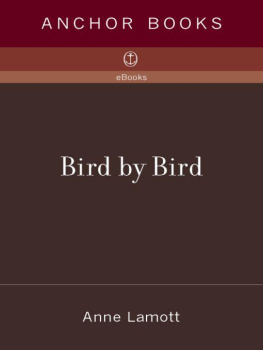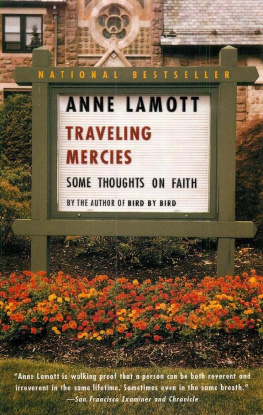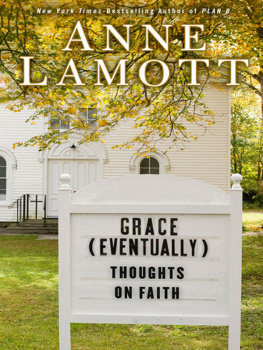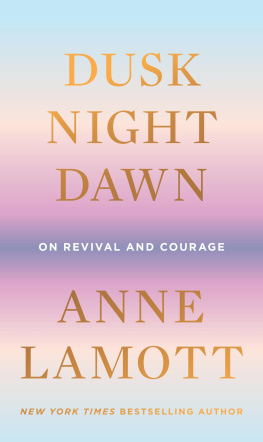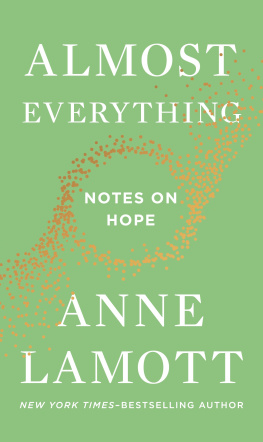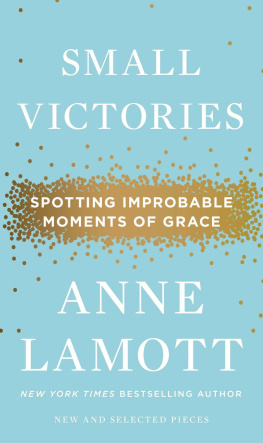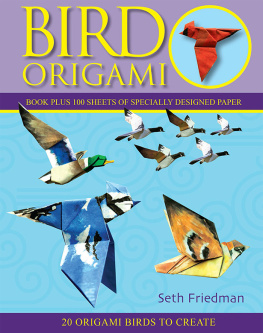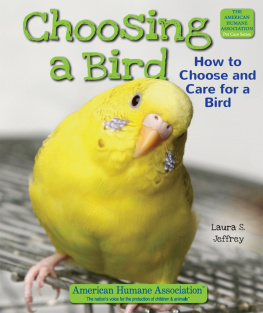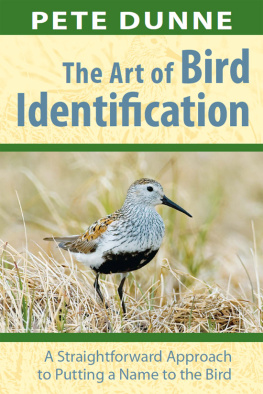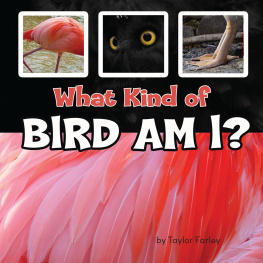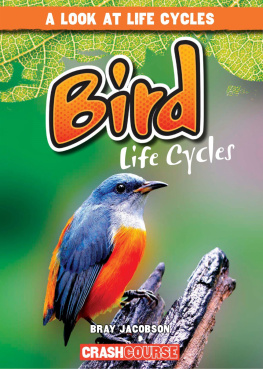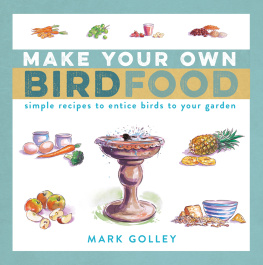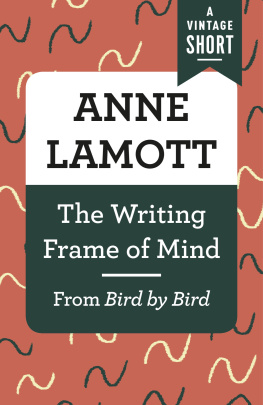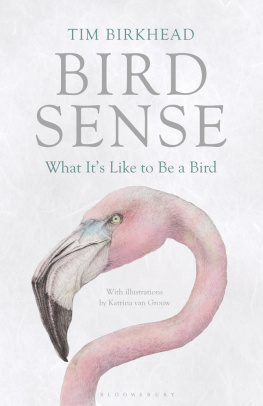Anne Lamott - Bird by Bird: Some Instructions on Writing and Life
Here you can read online Anne Lamott - Bird by Bird: Some Instructions on Writing and Life full text of the book (entire story) in english for free. Download pdf and epub, get meaning, cover and reviews about this ebook. year: 1995, publisher: Anchor, genre: Art. Description of the work, (preface) as well as reviews are available. Best literature library LitArk.com created for fans of good reading and offers a wide selection of genres:
Romance novel
Science fiction
Adventure
Detective
Science
History
Home and family
Prose
Art
Politics
Computer
Non-fiction
Religion
Business
Children
Humor
Choose a favorite category and find really read worthwhile books. Enjoy immersion in the world of imagination, feel the emotions of the characters or learn something new for yourself, make an fascinating discovery.
- Book:Bird by Bird: Some Instructions on Writing and Life
- Author:
- Publisher:Anchor
- Genre:
- Year:1995
- Rating:4 / 5
- Favourites:Add to favourites
- Your mark:
- 80
- 1
- 2
- 3
- 4
- 5
Bird by Bird: Some Instructions on Writing and Life: summary, description and annotation
We offer to read an annotation, description, summary or preface (depends on what the author of the book "Bird by Bird: Some Instructions on Writing and Life" wrote himself). If you haven't found the necessary information about the book — write in the comments, we will try to find it.
Bird by Bird: Some Instructions on Writing and Life — read online for free the complete book (whole text) full work
Below is the text of the book, divided by pages. System saving the place of the last page read, allows you to conveniently read the book "Bird by Bird: Some Instructions on Writing and Life" online for free, without having to search again every time where you left off. Put a bookmark, and you can go to the page where you finished reading at any time.
Font size:
Interval:
Bookmark:

Table of Contents
ALSO BY ANNE LAMOTT
Hard Laughter
Rosie
Joe Jones
All New People
Operating Instructions
Crooked Little Heart
Traveling Mercies
Blue Shoe
Plan B: Further Thoughts on Faith
This book is dedicated
to Don Carpenter
& Neshama Franklin
& John Kaye
Acknowledgments
I would like to acknowledge the extraordinary debt I owe to the writers who have told me such wise things about writing over the years: Martin Cruz Smith, Jane Vandenburgh, Ethan Canin, Alice Adams, Dennis McFarland, Orville Schell, and Tom Weston.
I would not be able to get my work done without the continual support and vision of my editor, Jack Shoemaker. My agent, Chuck Verrill, is just wonderful as is Nancy Palmer Jones, who copy-edited this book (and the last) with enormous skill and warmth and precision.
I want to mention once again that I do not think Id even be alive today if not for the people of St. Andrew Presbyterian Church, Marin City, California.
Sam said to me the other day, "I love you like 20 tyrannosauruses on 20 mountaintops," and this is the exact same way in which (love him.
Introduction
I grew up around a father and a mother who read every chance they got, who took us to the library every Thursday night to load up on books for the coming week. Most nights after dinner my father stretched out on the couch to read, while my mother sat with her book in the easy chair and the three of us kids each retired to our own private reading stations. Our house was very quiet after dinnerunless, that is, some of my fathers writer friends were over. My father was a writer, as were most of the men with whom he hung out. They were not the quietest people on earth, but they were mostly very masculine and kind. Usually in the afternoons, when that days work was done, they hung out at the no name bar in Sausalito, but sometimes they came to our house for drinks and ended up staying for supper. I loved them, but every so often one of them would pass out at the dinner table. I was an anxious child to begin with, and I found this unnerving.
Every morning, no matter how late he had been up, my father rose at 5:30, went to his study, wrote for a couple of hours, made us all breakfast, read the paper with my mother, and then went back to work for the rest of the morning. Many years passed before I realized that he did this by choice, for a living, and that he was not unemployed or mentally ill. I wanted him to have a regular job where he put on a necktie and went off somewhere with the other fathers and sat in a little office and smoked. But the idea of spending entire days in someone elses office doing someone elses work did not suit my fathers soul. I think it would have killed him. He did end up dying rather early, in his mid-fifties, but at least he had lived on his own terms.
So I grew up around this man who sat at his desk in the study all day and wrote books and articles about the places and people he had seen and known. He read a lot of poetry. Sometimes he traveled. He could go anyplace he wanted with a sense of purpose. One of the gifts of being a writer is that it gives you an excuse to do things, to go places and explore. Another is that writing motivates you to look closely at life, at life as it lurches by and tramps around.
Writing taught my father to pay attention; my father in turn taught other people to pay attention and then to write down their thoughts and observations. His students were the prisoners at San Quentin who took part in the creative-writing program. But he taught me, too, mostly by example. He taught the prisoners and me to put a little bit down on paper every day, and to read all the great books and plays we could get our hands on. He taught us to read poetry. He taught us to be bold and original and to let ourselves make mistakes, and that Thurber was right when he said, "You might as well fall flat on your face as lean over too far backwards." But while he helped the prisoners and me to discover that we had a lot of feelings and observations and memories and dreams and (God knows) opinions we wanted to share, we all ended up just the tiniest bit resentful when we found the one fly in the ointment: that at some point we had to actually sit down and write.
I believe writing was easier for me than for the prisoners because I was still a child. But I always found it hard. I started writing when I was seven or eight. I was very shy and strange-looking, loved reading above everything else, weighed about forty pounds at the time, and was so tense that I walked around with my shoulders up to my ears, like Richard Nixon. I saw a home movie once of a birthday party I went to in the first grade, with all these cute little boys and girls playing together like puppies, and all of a sudden I scuttled across the screen like Prufrocks crab. I was very clearly the one who was going to grow up to be a serial killer, or keep dozens and dozens of cats. Instead, I got funny. I got funny because boys, older boys I didnt even know, would ride by on their bicycles and taunt me about my weird looks. Each time felt like a drive-by shooting. I think this is why I walked like Nixon: I think ( was trying to plug my ears with my shoulders, but they wouldnt quite reach. So first I got funny and then I started to write, although I did not always write funny things.
The first poem I wrote that got any attention was about John Glenn. The first stanza went, "Colonel John Glenn went up to heaven / in his spaceship, Friendship Seven." There were many, many verses. It was like one of the old English ballads my mother taught us to sing while she played the piano. Each song had thirty or forty verses, which would leave my male relatives flattened to our couches and armchairs as if by centrifugal force, staring unblinking up at the ceiling.
The teacher read the John Glenn poem to my second-grade class. It was a great moment; the other children looked at me as though I had learned to drive. It turned out that the teacher had submitted the poem to a California state schools competition, and it had won some sort of award. It appeared in a mimeographed collection. I understood immediately the thrill of seeing oneself in print. It provides some sort of primal verification: you are in print; therefore you exist. Who knows what this urge is all about, to appear somewhere outside yourself, instead of feeling stuck inside your muddled but stroboscopic mind, peering out like a little undersea animal a spiny blenny, for instancefrom inside your tiny cave? Seeing yourself in print is such an amazing concept: you can get so much attention without having to actually show up somewhere. While others who have something to say or who want to be effectual, like musicians or baseball players or politicians, have to get out there in front of people, writers, who tend to be shy, get to stay home and still be public. There are many obvious advantages to this. You dont have to dress up, for instance, and you cant hear them boo you right away.
Sometimes I got to sit on the floor of my fathers study and write my poems while he sat at his desk writing his books. Every couple of years, another book of his was published. Books were revered in our house, and great writers admired above everyone else. Special books got displayed prominently: on the coffee table, on the radio, on the back of the john. I grew up reading the blurbs on dust jackets and the reviews of my fathers books in the papers. All of this made me start wanting to be a writer when I grew upto be artistic, a free spirit, and yet also to be the rare working-class person in charge of her own life.
Still, I worried that there was never quite enough money at our house. I worried that my father was going to turn into a bum like some of his writer friends. I remember when I was ten years old, my father published a piece in a magazine that mentioned his having spent an afternoon on a porch at Stinson Beach with a bunch of other writers and that they had all been drinking lots of red wine and smoking marijuana. No one smoked marijuana in those days except jazz musicians, and they were all also heroin addicts. Nice white middle-class fathers were not supposed to be smoking marijuana; they were supposed to be sailing or playing tennis. My friends fathers, who were teachers and doctors and fire fighters and lawyers, did not smoke marijuana. Most of them didnt even drink, and they certainly did not have colleagues who came over and passed out at the table over the tuna casserole. Reading my fathers article, I could only imagine that the world was breaking down, that the next time I burst into my dads study to show him my report card hed be crouched under the desk, with one of my mothers nylon stockings knotted around his upper arm, looking up at me like a cornered wolf. I felt that this was going to be a problem; I was sure that we would be ostracized in our community.
Font size:
Interval:
Bookmark:
Similar books «Bird by Bird: Some Instructions on Writing and Life»
Look at similar books to Bird by Bird: Some Instructions on Writing and Life. We have selected literature similar in name and meaning in the hope of providing readers with more options to find new, interesting, not yet read works.
Discussion, reviews of the book Bird by Bird: Some Instructions on Writing and Life and just readers' own opinions. Leave your comments, write what you think about the work, its meaning or the main characters. Specify what exactly you liked and what you didn't like, and why you think so.

